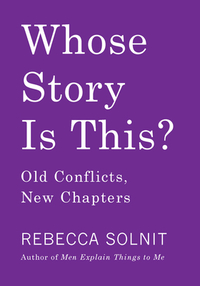You need to sign in or sign up before continuing.
Take a photo of a barcode or cover
hopeful
informative
inspiring
medium-paced
“Until the lion learns how to write, every story will glorify the hunter,” says an African proverb. But what if the lionesses write eloquently but the editors prefer the hunters’ version?”
I really just hope there is another one of these books every fall until the end of time, so that I can sit with Rebecca Solnit's essays and words every year and think about the past year and the future.
I really just hope there is another one of these books every fall until the end of time, so that I can sit with Rebecca Solnit's essays and words every year and think about the past year and the future.
Whose Story Is This? is my second Rebecca Solnit book this year. I first read A Field Guide for Getting Lost and fell in love with Solnit's way of weaving essays around a topic together. I've been wanting to engage with more of her feminist essays, so I was very excited to pick this up at the library.
I really enjoyed the collection of feminist essays Whose Story Is This?, but I think it's important to note that this collection contains essays that have been published in other publications so there are some points that Solnit makes over and over again in the essays that get a bit repetitive. They are very important points, but you'll read an essay with an idea and that idea will be brought up again in the next essay. This really stood out to me when she was pointing out how all the streets and buildings were named after men and she explores the idea of what would a city look like if more were named after women. I thought this was interesting, but then when I started the next essay, this idea was addressed again.
Sometimes while reading Solnit's work, I find the words so incredibly beautiful that I have to put the book down and just relish in the incredible way she crafts sentences. However, there are times where I find myself rereading what I had just read because she writes over my head at times. I bring this up because while this book is a bit shorter, I didn't find it to be as fast as a read as I was hoping.
I was very bothered at how Solnit used terms such as "tribe" despite having started her collection of essays referencing the oppression of Ingenious Peoples. I personally used to use words and phrases such as "spirit animal" and "pow-wow," but I have learned that using those words and phrases is insensitive. I know this continues to be an area of growth for me. I realize that this is a growing edge for Solnit as well. I felt compelled to share that I noticed this occasionally throughout the collection because I believe it's something that non-Ingenious Peoples can be better at doing.
I really enjoyed the collection of feminist essays Whose Story Is This?, but I think it's important to note that this collection contains essays that have been published in other publications so there are some points that Solnit makes over and over again in the essays that get a bit repetitive. They are very important points, but you'll read an essay with an idea and that idea will be brought up again in the next essay. This really stood out to me when she was pointing out how all the streets and buildings were named after men and she explores the idea of what would a city look like if more were named after women. I thought this was interesting, but then when I started the next essay, this idea was addressed again.
Sometimes while reading Solnit's work, I find the words so incredibly beautiful that I have to put the book down and just relish in the incredible way she crafts sentences. However, there are times where I find myself rereading what I had just read because she writes over my head at times. I bring this up because while this book is a bit shorter, I didn't find it to be as fast as a read as I was hoping.
I was very bothered at how Solnit used terms such as "tribe" despite having started her collection of essays referencing the oppression of Ingenious Peoples. I personally used to use words and phrases such as "spirit animal" and "pow-wow," but I have learned that using those words and phrases is insensitive. I know this continues to be an area of growth for me. I realize that this is a growing edge for Solnit as well. I felt compelled to share that I noticed this occasionally throughout the collection because I believe it's something that non-Ingenious Peoples can be better at doing.
Discussions with facts on what’s happening for women around the world right now. Also loved watching her interview with Emma Watson (https://youtu.be/yt4vOWBf6WA)
informative
reflective
fast-paced
Full review at : http://readwithwine.com/2019/12/review-whose-story-is-this
informative
inspiring
reflective
slow-paced
If I could wave a magic wand over myself, I would create a sparkly ability to orate masterfully, with zinging wit, unshakeable confidence, and an at-my-fingertips command of facts.
As it is, my tongue gets wrapped around my emotions, my skin flushes with frustration, and my belly bottoms out, taking with it all the words and opinions I hold as my truth. Hours— or days —after a debate or dispute, I am finally able to put together all that I really meant to say.
If I could wriggle my nose to improve myself, I would sound like an Evelyn Waugh character, or a David Mamet play, or, most dreamily, a Rebecca Solnit essay.
I've been reading Solnit's books for several years, swooning over her lucid and luminous writing, but she seems to have come into her own since the 2016 election, writing regularly for Literary Hub and The Guardian, her essays shared and quoted widely on social media, giving voice to our outrage and our hope for this strange, surreal, sad and beautiful world we have created.
Haymarket Books is now compiling Solnit's essays in an annual collection and this most recent edition, Whose Story Is This? Old Conflicts, New Chapters demonstrates what it means to be a feminist in a century that is already twenty years old — the lifting up and listening to voices of marginalized majorities that continue to be shouted down by the diminished but still powerful, frightened, and angry minority.
Solnit articulates my outrage that I need to seek empathy and understanding for a Trump voter, as if their fear at losing their place in society to people of color, women, LGBTQ, and non-evangelical Christians excuses their racism, misogyny, homophobia, and religious bigotry.
She points out over and over again how UNCOMFORTABLE men feel in the wake of #MeToo or white people in the face of #BlackLivesMatter, and I am reminded, bitterly, of my discomfort in examining my white privilege, and the gasping frustration I feel when I recognize how often I shift to make room for a man so he won't have to face his own stupid sexism. And frankly, the worst behavior I now experience comes from my own progressive cohort — men who think they are woke because they've checked all the liberal boxes and yet cannot check their impulse to condescend, mansplain, and pull power punches.
I turn to Rebecca Solnit's work for ways to name my outrage and despair. She rarely offers a course of action; hers is a consciousness-raising rather than a road map. She works with ideas, not listicles, a return to a more Socratic approach of reasoning through how we got to where we are and how we can shift to new path instead of leaping ahead to problem-solving. She blows apart mythologies and allows us room to see and hear all the pieces as they drift down to form new stories. Her words give me a way to my own voice, as shaky as it may be. Solnit also gives me hope.
As it is, my tongue gets wrapped around my emotions, my skin flushes with frustration, and my belly bottoms out, taking with it all the words and opinions I hold as my truth. Hours— or days —after a debate or dispute, I am finally able to put together all that I really meant to say.
If I could wriggle my nose to improve myself, I would sound like an Evelyn Waugh character, or a David Mamet play, or, most dreamily, a Rebecca Solnit essay.
I've been reading Solnit's books for several years, swooning over her lucid and luminous writing, but she seems to have come into her own since the 2016 election, writing regularly for Literary Hub and The Guardian, her essays shared and quoted widely on social media, giving voice to our outrage and our hope for this strange, surreal, sad and beautiful world we have created.
Haymarket Books is now compiling Solnit's essays in an annual collection and this most recent edition, Whose Story Is This? Old Conflicts, New Chapters demonstrates what it means to be a feminist in a century that is already twenty years old — the lifting up and listening to voices of marginalized majorities that continue to be shouted down by the diminished but still powerful, frightened, and angry minority.
The watershed called #MeToo in October 2017 was not that people spoke; it’s that other people listened. Many had spoken up before—the victims of the gymnastics doctor, the victims of R. Kelly—some over and over, and their testimony was ignored or disregarded. So #MeToo was not the beginning of women speaking up, but of people listening, and even then—as we’ve seen in the case of Christine Blasey Ford, testifying against Supreme Court nominee Brett Kavanaugh—continuing to be rendered inconsequential. One measure of how much power these voices and stories have is how frantically others try to stop them.From "Cathedrals and Alarm Clocks"
Solnit articulates my outrage that I need to seek empathy and understanding for a Trump voter, as if their fear at losing their place in society to people of color, women, LGBTQ, and non-evangelical Christians excuses their racism, misogyny, homophobia, and religious bigotry.
In the aftermath of the 2016 election, we were told that we needed to be nicer to the white working class, which reaffirmed the message that whiteness and the working class were the same thing and made the vast non-white working class invisible or inconsequential. We were told that Trump voters were the salt of the earth and the authentic sufferers, even though poorer people tended to vote for the other candidate. We were told that we had to be understanding of their choice to vote for a man who threatened to harm almost everyone who was not a white Christian man, because their feelings preempt everyone else’s survival. “Some people think that the people who voted for Trump are racists and sexists and homophobes and deplorable folks,” Bernie Sanders reprimanded us, though studies showed that many were indeed often racists, sexists, and homophobes.From "Whose Story (and Country) Is This?"
She points out over and over again how UNCOMFORTABLE men feel in the wake of #MeToo or white people in the face of #BlackLivesMatter, and I am reminded, bitterly, of my discomfort in examining my white privilege, and the gasping frustration I feel when I recognize how often I shift to make room for a man so he won't have to face his own stupid sexism. And frankly, the worst behavior I now experience comes from my own progressive cohort — men who think they are woke because they've checked all the liberal boxes and yet cannot check their impulse to condescend, mansplain, and pull power punches.
I turn to Rebecca Solnit's work for ways to name my outrage and despair. She rarely offers a course of action; hers is a consciousness-raising rather than a road map. She works with ideas, not listicles, a return to a more Socratic approach of reasoning through how we got to where we are and how we can shift to new path instead of leaping ahead to problem-solving. She blows apart mythologies and allows us room to see and hear all the pieces as they drift down to form new stories. Her words give me a way to my own voice, as shaky as it may be. Solnit also gives me hope.
We live in a world where uncountable numbers of women have had their creative and professional capacity undermined by trauma and threat, by devaluation and exclusion. A world in which women were equally free and encouraged to contribute, in which we lived without this pervasive fear, might be unimaginably different. In the same way, a United States in which people of color did not have their votes increasingly suppressed, in which they did not also face violence and exclusion and denigration, might not just have different outcomes in its recent elections but different candidates and issues. The whole fabric of society would be something else. It should be. Because that is what justice would look like, and peace, or at least the foundation on which they could be built.From "Let This Flood of Women’s Stories Never Cease"
Rebecca Traister and others have made the important point that we should not mourn the end of the creative lives of the men being outed as predators; we should contemplate the creative contributions we never had, will never know, because their creators were crushed or shut out. When Trump was elected we were told not to normalize authoritarianism and lies, but the losses due to misogyny and racism have been normalized forever. The task has been to de-normalize them and break the silence they impose. To make a society in which everyone’s story gets told.
This too is a war about stories.
Her metaphors seem to take on the teetering logic of numerology. 'Voter Suppression Begins at Home' brought up something I never thought about before though.






